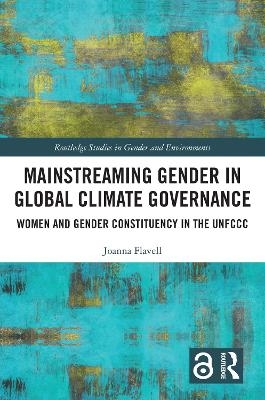
Mainstreaming Gender in Global Climate Governance
Routledge (Verlag)
978-1-032-30752-7 (ISBN)
It is now commonplace for gender to be framed as a political issue in global climate politics within academic scholarship, but there is typically a lack of robust empirical analysis of existing advocacy approaches. Filling this lacuna, Joanna Flavell interrogates the political strategies of the Women and Gender Constituency (WGC) in the UNFCCC (The United Nations Framework Convention on Climate Change). Through a conceptual framework that integrates climate change with intersectional critical inquiry and political practice, Flavell analyses hundreds of historical documents, coupled with interviews and observations from two UNFCCC conferences. This research uncovers a so-far untold story about the history of the UNFCCC that foregrounds gender and feminist advocacy, highlighting the importance of the WGC in shaping dominant narratives of global climate governance through a series of rhetorical and procedural strategies. Overall, the book draws important conclusions around power in global climate governance and opens up new avenues for advancing a feminist green politics.
This volume will be of great interest to students and scholars of environmental justice, climate politics and governance, environmental activism, and gender studies more broadly.
An electronic version of this book, available at www.taylorfrancis.com, has been made available under a Creative Commons Attribution-Non Commercial-No Derivatives 4.0 license, thanks to the support of libraries working with Knowledge Unlatched (KU). KU is a collaborative initiative designed to make high quality books Open Access for the public good. The Open Access ISBN for this book is 9781003306474. More information about the initiative
and links to the Open Access version can be found at www.knowledgeunlatched.org.
Joanna Flavell is a Fellow an ecofeminist scholar researching and teaching in environmental politics, with a special interesting in activism in global climate politics. Joanna’s 2020 paper ‘The embodied politics of climate change: analysing the gendered division of environmental labour in the UK’ was published in Environmental Politics and was shortlisted for the best paper award 2020.
Table of Contents
List of Acronyms
List of Tables
List of Figures
Acknowledgements
1 - Introduction
Why ‘Gender and Climate Change’?
The UNFCCC as a Site of Inquiry
Overview of the Book
2 - Enduring Debates in Feminist Climate Praxis
Theorising Feminist Climate Activism
Enduring Debates
Dilemmas of Rhetorical Strategy
Radical Outsiders versus Pragmatic Insiders
Questions of Power Dynamics and Hierarchies
The Activist - Academic Divide
Conclusion
3 - Ecofeminist Intersectionality: Inquiry and Praxis
Ecofeminist Intersectionality as Critical Inquiry
Social Inequalities
Intersecting power relations
Contextuality
Relationality
Complexity
Ecological Justice
Transversal Politics as Ecofeminist Intersectional Praxis
Solidarity Politics
Epistemic Communities
Flexible Dialogue
Conclusion
4 - From Zero Gender to GAP: Foregrounding gender in UNFCCC history
Phase 1: Zero Gender -1992 – 2007
Early Days: 1992 – 2002
Getting Organised: 2003 – 2005
Gaining Momentum: 2006 – 2007
Phase two: Mainstreaming Gender into the UNFCCC - 2007 - 2013
Getting Noticed: 2007 – 2009
Feminist Leadership: 2010 – 2013
Phase 3: Gender Action Plan - 2014 – 2021
Towards Implementation: 2014 – 2015
Extending the Lima Work Programme on Gender: 2016
The Gender Action Plan: 2017 - 2021
Conclusion
5 – Political Strategies Mobilised by the Women and Gender Constituency
Rhetorical Strategies
Gender Equality and Empowerment of Women
Universalising lived experience
Equating Gender with Women
Intersectionality in Baby Steps
Procedural Strategies
Identifying entry points for gender aspects into the climate change debate
Raising awareness and disseminating information
Building women’s capacity and joint strategizing
Developing a future research agenda
Conclusion
6 – Lessons for Ecofeminist Intersectional Praxis
Lessons from the WGC for Intersectional Inquiry and Praxis
Lesson One: There are No Easy Solutions
Lesson Two: Prevalent domains of power have hindered intersectional praxis in the UNFCCC
Lesson Three: Intersectional inquiry and practice cannot be separated
Towards an Ecofeminist Transversal Politics
Option One: Fold and Withdraw
Option Two: ‘Business as Usual’
Option Three: Ecofeminist Transversal Politics
Conclusion
7 - Conclusion: New Directions for Ecofeminist Intersectional Praxis
Original Contributions
Coda
Appendix 1 - Methodology
Introduction
Collecting Data: Gathering Data, Conducting Interviews and Observation
Gathering Data
Elite Interviews
Direct Observation
Interpretation and Analysis of Documents
Internal Validity and Limitations of the Research
Bibliography
Index
| Erscheinungsdatum | 10.09.2024 |
|---|---|
| Reihe/Serie | Routledge Studies in Gender and Environments |
| Zusatzinfo | 2 Tables, black and white; 5 Line drawings, black and white; 5 Illustrations, black and white |
| Verlagsort | London |
| Sprache | englisch |
| Maße | 156 x 234 mm |
| Gewicht | 367 g |
| Themenwelt | Naturwissenschaften ► Biologie ► Ökologie / Naturschutz |
| Sozialwissenschaften ► Politik / Verwaltung ► Staat / Verwaltung | |
| Sozialwissenschaften ► Soziologie ► Gender Studies | |
| ISBN-10 | 1-032-30752-8 / 1032307528 |
| ISBN-13 | 978-1-032-30752-7 / 9781032307527 |
| Zustand | Neuware |
| Informationen gemäß Produktsicherheitsverordnung (GPSR) | |
| Haben Sie eine Frage zum Produkt? |
aus dem Bereich


